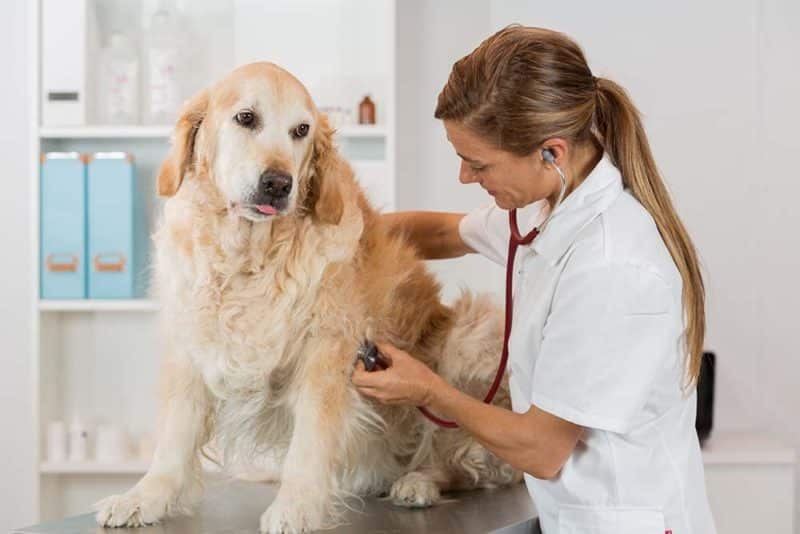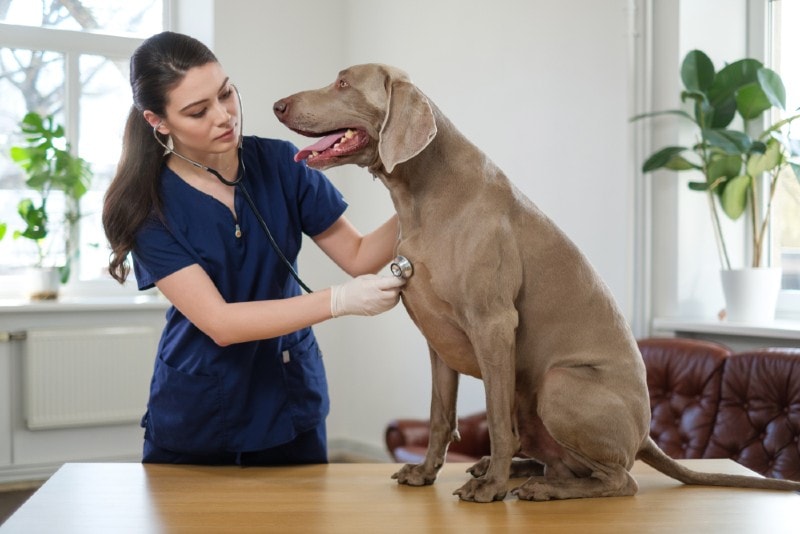In this article
Do you think that your dog’s heart is beating faster than usual and want to know what the normal heart rate is for dogs? As a general rule, a dog’s heart rate varies according to their size and age but is generally somewhere between 60 and 120 beats per minute. Therefore, small dogs and puppies will have faster heartbeats than large breeds.
Your dog’s heart can beat faster or slower than normal for many reasons, such as prolonged or intense physical activity, fever, infection, internal bleeding, anemia, exposure to sun and heat, dehydration, or heart disease.
Contact a veterinarian if your dog experiences any clinical signs besides a rapid heart rate, such as coughing, lethargy, loss of appetite, reduced activity or intolerance to exercise, fever, dehydration, fainting, or convulsions.

What Is the Normal Heart Rate for Dogs?
The heart rate can vary significantly between dogs, depending on their age and size. It is the measure of how many times the heart beats in 1 minute. Familiarizing yourself with your dog’s heart rate at rest and during exercise will help you notice subtle changes that can sometimes indicate a health concern.
Heart rate in healthy dogs varies1:
- Newborn puppies: Up to 200 beats per minute (bpm)
- Two-week-old puppies: 160–200 bpm
- Toy breeds: Up to 140 bpm, but may be higher
- Small breeds: 90–120 bpm
- Medium breeds: 70–110 bpm
- Large breeds: 60–90 bpm
Dogs’ heart rates can also vary depending on their age. The younger the dog, the faster the heartbeat. A normal heartbeat should be strong, with a regular rhythm.
If you suspect your pet has an abnormal heart rate, you should contact a vet directly for an assessment. They can provide you with more information and a care plan.
Did you know you can speak to a veterinarian without having to travel? Just head over to PangoVet. It's our online service where you can talk to a vet online and get the advice you need for your pet — all at an affordable price!


How to Measure Your Dog’s Heart Rate
The best place to feel your dog’s pulse is the femoral artery, which is on the inside of the back leg, mid-thigh. When your dog is relaxed, place the tip of your finger or the tips of two fingers on it and count the beats for 1 minute. It is easiest when your dog is standing. If your dog does not want to stay still for that long, you can count 15 seconds and multiply by four.2
In underweight dogs, you can measure their heart rate by feeling their heart beating through their chest. You can do this by placing your fingers or palm on the left side of your dog’s chest. If you’re unsure how to do this, speak to a veterinarian.
If your dog is excited or has been running, their heartbeat will increase. Therefore, it is necessary to ensure that your four-legged friend is calm and relaxed before you perform this measurement.
You should take your dog’s pulse or measure their heart rate several times over a couple of days to establish a normal baseline. A fast or slow pulse can be cause for concern but not always. It will depend on what the dog is doing at the time, how they are feeling, or if they are exhibiting any other signs of being unwell.


Why Is My Dog’s Heart Beating So Fast?
A rapid heart rate (tachycardia) can be something as simple as prolonged physical activity, fear, excitement, or anxiety, but it can also indicate other conditions, such as dehydration, pain, fever, or heat stroke.
- Systemic infection (septicemia)
- Birth defect
- Internal bleeding
- Shock
- Traumatic injuries
- Anemia
- Lung disease
- Pancreatitis
- Gastrointestinal disease
- Heart disease
- Electrolyte imbalances
- Shortness of breath
- Dizziness or loss of balance
- Confusion
- Lethargy
- Collapse
- Inability to walk or move
- Pale gums
- Distended abdomen
- Exercise intolerance
- Coughing
- Fainting
- Fever
- Vomiting
- Pain
These are just some of the possible signs that may be accompanied by a faster-than-normal heart rate, as many possible medical conditions can lead to this sign, and we cannot list them all. Take your dog to the vet if they have a faster heart rate or any other clinical signs.


Why Is My Dog’s Heart Beating So Slowly?
- Hypothermia (low body temperature)
- Hypothyroidism (reduced thyroid gland function)
- Heart disease
- Sick sinus syndrome
- Electrolyte imbalances
- Certain medicines
- Poisoning
The clinical signs of bradycardia in dogs, when associated with some of the diseases and organ systems mentioned, may be quite similar to those of tachycardia. It’s important to know your dog’s normal heart rate at rest, and if there are any sudden changes in the rate when your dog is not exercising or shows any of the previously mentioned clinical signs of illness, it’s crucial to get them checked by the vet immediately.


Is a Dog’s Heart Beat Irregular?
Heartbeats in healthy dogs should not be irregular. Irregular (or abnormal) heart rhythm is called arrhythmia. When this happens, your dog’s heart can beat too slowly or too fast in an irregular rhythm or skip a beat.
Something that should be distinguished from abnormal arrhythmia is respiratory sinus arrhythmia. This is normal and should not cause you any concern. This means that whenever the dog breathes in, their heart will beat faster and slow down as they breathe out. In other cases, though, arrhythmias are a cause of concern and should always be evaluated by a vet.
- Anemia
- Structural heart disease
- Congenital heart defects
- Spleen, liver, gastrointestinal, or brain diseases
- Cancer
- Certain medicines
- Toxins
- Age-related changes
- Trauma to the heart muscle
The clinical signs of arrhythmia are usually not shown unless they are abnormal, sustained for a prolonged time, or come up very suddenly. Some clinical signs a dog with arrhythmia may display are lethargy, reduced exercise tolerance, fainting, coughing, wobbly walking, labored breathing, distended abdomen, etc.; others may appear normal.

What Are the Signs of Heart Failure in Dogs?
Heart failure is the inability of the heart muscle to perform its normal function, which prevents optimal blood circulation. In other words, it is a condition that occurs when a heart disease progresses irreversibly to its final stage. As a result, the heart cannot pump blood throughout your dog’s body.
This condition is usually an inevitable consequence of heart disease in dogs, more common in senior dogs. It is a life-threatening condition and can lead to your pet’s death. Many of the clinical signs associated with heart disease and heart failure in dogs are usually accompanied by a history of chronic heart disease in patients taking daily heart medications, but they can also be present in several other health conditions.
Severe signs of heart disease can sometimes occur as a more acute condition in cases of infections affecting the heart muscle or the presence of parasites in the heart or lungs.
Clinical signs of heart failure in dogs may include:
- Coughing at rest or during sleep
- Decreased appetite
- Weight loss
- Pale or bluish gums
- Accumulation of fluid in the abdomen (ascites)
- Difficulty breathing
- Panting
- Pacing and unsettledness
- Lethargy
- Fainting episodes
- Inability to exercise or even go for a walk
If your dog suffers from heart disease and you notice that they have become lethargic, are breathing with difficulty, have a persistent cough, are panting a lot, get tired quickly, or have no energy, the disease may have worsened and progressed to heart failure, and they need to see the vet urgently.
How Long Does a Dog With Heart Failure Live?
If your dog suffers from heart failure, the prognosis is unfortunately not good. If the condition is untreated, it can lead to deterioration and death in a relatively short time. But even with the right treatment, the life expectancy of dogs with heart failure is generally days to weeks, although some patients may cope for a few months.
It’s important to speak to a vet about your dog’s quality of life; the decision to euthanize may be considered if the dog is suffering and not enjoying its time.

Final Thoughts
Depending on your dog’s size and age, their heart rate should be between 60 and 120 beats per minute, but it can be below or above these limits and still be normal. You must speak to a vet if you think your dog’s heart beats fast when resting, even if they do not show any other clinical signs.
The causes of a heart rate that is too high or too low are multiple and may include heat stroke, fever, hypothermia, heart disease, poisoning, internal bleeding, cancer, systemic organ disease, etc. If your dog’s heartbeats are too fast or slow, a vet can determine the underlying cause and start the appropriate treatment.
Featured Image Credit: Nejron Photo, Shutterstock

















